You’re listening to Burnt Toast! This is the podcast about anti-fat bias, diet culture, parenting, and health. I’m Virginia Sole-Smith.
Today I am chatting with the delightful Phoebe Wahl.
Phoebe is an award winning author, illustrator, and surface designer whose work focuses on themes of comfort, fantasy, and intimacy with nature and one another.
She grew up unschooled in Washington State and graduated from Rhode Island School of Design in 2013 with a BFA in illustration. Her first children’s book, Sonya’s Chickens, was the recipient of the Ezra Jack Keats Book Award for New illustrators. And her most recent book, Little Witch Hazel was an indie best seller, Junior Library Guild Gold Standard title, and named one of the best books of 2021 by Book Page, Book Riot, Book List, the Chicago Public Library—and my children and me. Her other titles include The Blue House, Backyard Fairies, and the brand new, out this week, illustrated young adult novel, Phoebe’s Diary.
If you order Phoebe’s Diary from the Burnt Toast Bookshop, you can get 10 percent off that purchase if you also order (or have already ordered!) Fat Talk! (Just use the code FATTALK at checkout.)
We’re going to talk a lot about the new book, of course. But I also wanted to talk to Phoebe about fat fashion—because Corinne and I are obsessed with her style, and about how we figure out style and aesthetics, and I got a lot of your questions in the conversation, too. So we get into being a creative, being a mom, so many things. Phoebe is one of those people you can talk to all day and I almost did! So I think you will love the conversation.
PS. If you’re enjoying the podcast, make sure you’re following us (it’s free!) in your podcast player! We’re on Apple Podcasts, Spotify, Stitcher, and Pocket Casts! And while you’re there, please leave us a rating or review. (We like 5 stars!)
Episode 109 Transcript
Phoebe
My name is Phoebe Wahl and I am an author, illustrator, surface designer, occasional art teacher, and mom to an 18 month old.
Virginia
An adorable 18 month old from what I see on Instagram. Really a highly edible baby. But we are here to talk about your new book, Phoebe’s Diary, which is out this week! I love it so much. You captured everything about that time of life and how everything is confusing and intense and wonderful and awful all the same. It is so many teenage emotions.
Phoebe
Yes, very raw teenage emotions.
Virginia
You drew on your own teenage diaries to write this. And I mean, I want to die just thinking about rereading my own teenage diaries, let alone publishing or having any part of them be public. So please tell us how you did this, both the process, like do you draw first? Do you write first? But also, how did you decide to excavate such vulnerable years of your life?
Phoebe
Generally, I write first. Sometimes I kind of get an instantaneous download in my mind of all the writing and all the images at once, and then the process of creating a book is kind of figuring out how to retroactively make that thing. I would say for this book, when I found this diary—so my mom brought it over. I live in the same town as my mom, which is fun, because she often brings boxes of my childhood stuff over that then I have to deal with that I can’t just eternally store in her house, whereas my sister gets to permanently store stuff at my mom’s house.
So I had this diary that my mom brought over. I started looking at bits and pieces of it while I was organizing things and putting stuff away. And I was really struck by the way that I wrote when I was a teenager, because it almost felt like I was writing for an audience. It had this tone about it that felt kind of like the tone of a book. It’s probably because I was a huge reader and a huge nerd and read a lot of diaristic books when I was a teenager. But I was kind of surprised by the fact that it already felt a little bit like a story.
Reading through it, I continued to be surprised by the loose bones of a plot. A lot of the plot is fictionalized—the book is overall fiction—but still, there were elements that felt like the beginning of a story. And even the way the book starts, where I’m like, “I’m starting this new diary, but I never finish things, so it’ll be interesting to see if I finish this one.” And then I do actually finish it. And even that almost feels like a weird setup. Like, why? How did I write that? It felt really interesting. I was like this could lend itself so easily to being an actual book.
A few years ago I made a zine called Old Diary Entries About Sex. That was just a couple of different key entries that I pulled that I thought were funny or charming or meaningful, and made it into a short, really limited edition zine and sold it at a couple festivals. I don’t even think I sold it online. But it was popular enough and fun enough to make that I was kind of like, “Maybe this would be fun to expand someday.”
But it wasn’t until I was stuck inside during early COVID and was organizing things again and going through the journal. We were in a pod with my best friend and I started reading her little bits of the journal and also actually started reading little bits to another friend who one of the characters in the book is based on, an old high school friend.
We had a couple of nights in COVID where we were like outside in the freezing cold in the winter, huddled reading our high school diaries to each other, and just laughing about the insane drama of the stories, but also how painfully relatable they were, even to our adult selves. There are these moments of extreme lack of self-awareness coupled with this hyper awareness of why I’m feeling the things I’m feeling or what that’s influenced by. Just through sharing it with friends and their reactions to it, and how much they related to it, and were laughing at it, I was kind of like, okay, well, maybe this could be something bigger that isn’t just like a little project for me.
And so I started by transcribing the whole diary, which was about 25,000 words.
Virginia
Oh my goodness.
Phoebe
To be clear, I am also extremely mortified by this diary. Like totally excited for it to be in the world, but also very nervous and embarrassed. And transcribing the raw diary—if you think the final book is cringey, the original diary was just beyond. It was really hard not to self censor the most awkward parts as I wrote and just be like, Nope, this is a transcript. The next part will come later.
Virginia
Right, now I just have to deal with how I said that thing. And I want to be clear, I don’t think the final book is cringey, I think it is beautiful and so full of heart. But I can imagine this looking in the mirror phase was not the easiest.
Phoebe
For sure.
But yeah, so I started by transcribing it and then when I transcribed it, I just started to have all these thoughts of like, oh, like, what are the things I could add to heighten this plot or to raise the stakes of the story and make it more interesting.
And, of course, in a real diary there is just a wide variety of people, family, friends, neighbors, school friends. A lot of the fictionalizing and editing process had to do with condensing all these different things that happen to you in real life into a much smaller world so that it’s more contained and understandable for a reader.
And then, I kept workshopping it with friends and ended up sending it to my agent, like really, really embarrassingly, and was like, “maybe this is the worst thing that anyone’s ever written in history but if you’d ever want to look at it and at least tell me that then I can move on from the pressure.”
Virginia
And instead, they were like, “Yes, I’ll make it a book,” and “keep going.”
Phoebe
Instead she was like, “I’m obsessed.” We ended up selling it to Little Brown.
Virginia
That’s so cool. So, of course I want to talk about the body stuff a little bit. It’s odd because Phoebe is you but Phoebe is a character in the book, so I’m going to talk about the character Phoebe.
Phoebe’s experiences with anti-fatness are a thread in the book, but not the central plot of it. There are comments, like her dad says a weird thing about bacon. And she sees a play with a fat actress in it and has that moment of profound recognition. But she’s also just super focused on her crushes and her sexuality and theater and friends. And all of that has nothing to do with body size, which I found to be a relief to be honest, that we have this fat character with so many dimensions beyond her experience of fatness. I would love to hear how you thought about writing Phoebe’s body.
Phoebe
It’s funny because the book is promoted as being body positive and it’s not like I think it’s necessarily body negative or something, but I feel like “body positive” has become a euphemism for “has a fat character.”
Virginia
A fat person wrote a book.
Phoebe
Yeah, exactly. I think the way you describe it as there being these threads of anti-fatness feels a lot more accurate. There are positive parts, like her finding her fat style icon and being just totally enamored. But there are also a lot of complex parts, or a few at least, about her not feeling entirely positive about her body.
It was really hard to balance those parts. I didn’t want those parts to come off as an example for teenagers because there are real teenagers reading this book. I mean, especially because this book was set in 2006, which is just like such a bleak time.
But also, it didn’t feel realistic to not include some moments of that. Because I also didn’t want it to be a book that’s too shiny. There are a lot of moments in the book where my character, the character of Phoebe, isn’t always the best person in the book, you know? and I think the body stuff kind of mirrors that. She’s not necessarily this paragon of body positivity, but she hopefully feels like a real person, which felt more important to me.
There was some discussions of, like, should we include more passages about her relationship with her body, and I kind of landed on no. A part of that was because my real diary had a few things sprinkled throughout, but for the most part I was just focused on my crushes and theater and my other stuff going on in my life. It’s complicated, too, by the fact that I was in a smaller body than I am now in high school. I was the highest end of the straight size spectrum, I would say. But in making a fictional book, I was like, well, now my experience feels so tied to the body I’m in now as this small/mid fat person, that it felt much more alive to me to make her body closer to what it is now. And also, just putting a book out into the world for teenagers, it felt more important to me to have fat rep than to have large straight size to mid size rep.
Virginia
I agree with that. And I think you’re doing all of it. The fact that you draw her in a bigger body and we see her, even if she has these tough moments with her body, which every teenager does, and certainly every fat teenager does, but you’re also showing that she’s so much more than her body. That is very radical and important fat rep.
Phoebe
Thank you.
Virginia
I thought you got it really right.
I also loved these moments where she would put on some cool early 2000s fashion and be like, “I feel so cute.” And I was like, yeah, that’s right, that is a great sweater or whatever. She had a lot of moments of going to parties and being like, “I feel good about this look.” That was really fun.
Phoebe
Well, thank you.
Virginia
You have given us the gift of Little Witch Hazel. Anyone who doesn’t have Little Witch Hazel in your children’s library, what are you doing? It’s just the most beautiful, wonderful, fat positive without discussing fatness character. Then of course you have your hobby Instagram, fat in picture books where you show a lot of fat characters, which is completely delightful. So how do you think about fat rep in kids books, in general? Where do you think we’re making progress? Where do you think we still need to work on it?
Phoebe
It’s getting so much better than it used to be. I only entered the industry 10 years ago and I feel like there is so much more body diversity now. I feel like where it’s really getting better is in new people entering the industry. There are a lot of newer books and newer folks entering the industry who seem to have more of an awareness of casually incorporating body diversity of all kinds.
I think where it still could grow is in more established and maybe especially some old guard kind of illustrators and authors. I get this inclination that, you’re in your work mode, you’re in the way you already do things and so maybe there’s less continual analysis of like, what if I did this differently? What if I included this new kind of person? So I think that’s where it could still improve. I think it could absolutely still improve overall, you know? The improvements we’re seeing are absolutely not enough. But I do feel like I am consistently surprised now when I go to the bookstore or the library and I’m like, hey, there’s like a casual fat person in the background of this book and they’re not, like, gorging themselves on sausages or something.
It’s definitely going in a really good direction. I just really hope that this current regression, culturally, that I feel like we’re in that feels maybe like some pushback to the body positive fat liberation movement—I really hope that that doesn’t swing into picture books and that they just keep improving.
Virginia
I get readers DMing me whenever they’re outraged when they’re reading a book with their kid, and often it’s the books from our childhood—or I’m a little older than you, so my childhood. It’s the Berenstein Bears’ Too Much Junk Food.
People will pick up an older kids book and be horrified to realize it has fat jokes and fat stereotypes. And then of course, we have Strega Nona. There are some iconic characters in older children’s books, but yeah, a lot of it is like we all need to do the work to find and support the new authors.
Phoebe
Even icons like Strega Nona, who I absolutely love, I think still kind of sometimes fit into this archetype of like a mother-y archetype. Maybe she doesn’t have her own children, but she’s still kind of the one who’s like, okay, I guess I’m going to save big Anthony from another chaotic situation.
Virginia
Yes, for sure. I agree. She’s upholding a lot of gender norms and expectations. She literally spends book after book just making pasta. So there is that, but also she’s wise and all knowing.
Phoebe
Yeah, she’s the profile pic on @fatinpicturebooks for a reason, because she is an icon.
I’m so glad that you enjoy that account. I feel really bad because I’ve totally fallen off the bandwagon posting on that account. I am kind of a chronically eyes-are-bigger-than-my-plate person, hobby-wise. I’m always getting really excited and starting things and then being really overwhelmed one week later.
Virginia
Oh I think that’s fine!
Phoebe
That one especially I was so excited about and then I went to crowdsource ideas of things to post. And I was like, this is amazing! People have so many ideas of fat characters that I don’t have. And then I was like, Oh shit, now I have to make a spreadsheet with all these things.
It got complicated, too, like, how much analysis? How much analysis do I post along with the image? Like I started being like, I’m just going to post a picture of that character, say what book it’s from, and there’s no commentary. But then that felt shitty if it’s a really fatphobic book. It felt like there needed to be some commentary, but it gets hard, too, because if we’re talking about contemporary books, these are people who are my peers in the industry. That also started just making me feel a little anxious, just being like how much do I want to, for this project that was supposed to be a fun hobby, now potentially have to very publicly call out or call in fellow authors and illustrators about problematic things in their books. All of that added up to me just being like I’m taking a break.
Virginia
Well, that’s fair. What is there is delightful for people to discover. I don’t think you need to feel like you have to keep charging ahead with it. I think it is a gift to all of us that you put up the content you did. And if you ever want to come back to it, great. And if not, someone else can run with that horse.
Phoebe
I would love to continue it eventually.
Virginia
Representation is always a complicated conversation. But in kids books, especially, there are a lot of layers to it. There is challenging the old stereotypes, there are characters that deal directly with anti-fatness in ways that give kids tools to do it. And then there’s the need to get to this place where characters can just be fat and not have that be their identity and central plot line. And all of this needs to happen at once.
Phoebe
The solution is always just more rep in general. But that’s kind of a hard note to just give the world.
Virginia
So Corinne, and I were chatting about like, oh, my gosh, we’re having Phoebe on and what do we want to talk to her about? And she immediately said, “Well, you have to ask about clothes because Phoebe has amazing style.” She is correct. You also have such a cohesive aesthetic throughout your art and your wardrobe. You dress how you draw, if that makes sense. I would love to hear your style story, how this developed. Because it’s so clear to me what is a Phoebe Wahl look.
Phoebe
Thank you. I’m very flattered that Corinne said that because Corinne is also one of my style icons! [Virginia Note: Same!]
I feel like I’ve kind of been in a confused moment with my style. Am I a linen sack woolly art teacher gnome or am I a wild, floral, cool, sexy garden lady? I feel there are always these two factions inside of me that are like, I just want to be comfortable and wear a sack and actually not feel this pressure to constantly show my identity and aesthetic through what’s on my body. And then also, sometimes just having so much legitimate love for things that do do that and wanting to wear them. So I think I mostly just need to come to peace with sometimes I’m going to be both and that’s okay.
My style story has changed so much as my body has really changed in the last 10 years. I used to wear a lot more vintage clothes and stuff like that when my body was smaller and I still really enjoy doing thrifting and stuff now, but I mean a with a kid I never have time. It’s something that you really have to devote a lot of time to if you want to find stuff, especially if you want to find plus size stuff. I mean, it’s basically impossible. Like Value Village, Goodwill, places like that, the big box thrift stores stop at my size. So it’s like maybe there’ll be a few things that I am interested in but for the most part, it’s stuff that I either don’t care about, or it doesn’t fit me.
I also started making my own clothes which was fun, but also takes a lot of time. I feel kind of in this struggle moment with knowing how to dress my body after having a baby and just not having very much time but wanting to feel confident and like myself, and I definitely also kind of compulsively shop when I feel anxious, I think. Because I’m like, well, maybe I’d feel better if I just got this thing and that’s what’s missing.
Virginia
It’s always the top that’s going to solve everything. Or the dress that’s going to fix all my problems.
I definitely went through the same thing, in terms of after I had my kids, both in terms of how motherhood changed my body and how shopping used to be one of my main hobbies, then both body size changes and the added hours I spend parenting that I used to be able to go shopping. Like, it doesn’t exist anymore. It was such a big shift and it was a really tricky transition.
I think we talk about it in terms of how do I find clothes that fit, but we don’t talk about it in terms of how do I find clothes that I love that are my aesthetic? Like what do I want my aesthetic to be now is changing. All of that is really murky territory.
Phoebe
There’s just so much shit that comes up. I mean, so much more internalized ageism and fatphobia and stuff that I think will continue to catch me off guard even after 32 years as a human.
Virginia
The pressure is on moms that you need to still look like you never did this thing. And even if you’re like, “I can clearly push back against that as diet culture,” I find it can still show up. It’s that thing you were just describing like, do I want to be the linen sack person? Or do I want to be sexy whatever? How do I bridge these things?
I also just prioritize comfort so much more than I let myself prioritize it in the past. That has been super liberating, I will say.
Phoebe
Yes, I agree. I can’t remember if it was on your Burnt Toast or somewhere else where someone talked about a great way to stop hating your body is to wear things that don’t feel like they’re policing your body.1 That is a really big thing for me. Do I hate this outfit? Or do I physically hate how it feels on my stomach when I bend over?
Virginia
Yeah, that is such a big one. Giving yourself permission to wear clothes that don’t hurt and police your body is is a big step.
Phoebe Answers Your Questions!
I also crowdsourced some listener questions, because I knew we had so many Phoebe fans. Here we go.
What are your favorite pens, notebooks, or other drawing tools?
Phoebe
Phoebe
Okay, so my favorite journal currently is this brand LEUCHTTURM1917. I think they’re German or Dutch or something. It’s just like the smoothest, most buttery paper and they have a pocket in the back of the journal and you can get dot grid or regular grid lines. I just do a blank book, but I am loving that journal. Even though I never have time to use it, but when I do I love it.
Virginia
I love it as an idea for me.
Phoebe
I also I think those might be a little more expensive, but I also really like the Hand Book brand which I can get at my local art supply store. I think they’re a little more common. And if you want a new hobby or you have time for such things: I used to make all my sketchbooks and that can be a really really fun project. And then you get to make it just the way you want with the paper you want.
But for pens and stuff, I have a really awesome writing pen. The brand is Rotring and it’s like a metal pen that has a very nice weight to it. It’s a nice ballpoint quality ink, but then just like the most delicious heavy weight of the pen. I also love Pentel and Kuretake brush pens, and for watercolors I would say Daniel Smith watercolors which are made in Seattle, which are really really wonderful.
Virginia
I am excited especially because we’re running this in September with back to school energy. I’m like, “I obviously need many new pens and notebooks despite not being someone who draws like that!” See previous discussion regarding compulsive shopping. Anyway, thank you for enabling us.
Did homeschooling and unschooling support your body positive art?
Phoebe
I think yes and no. I was very sheltered in some ways by it. I wasn’t super, super sheltered, but even just not going to school and especially not going to middle school—because I went to bits of elementary school and then high school part time. But even just skipping middle school, I feel like I missed out on a lot of toxic body comparison energy that I’m kind of grateful for.
But still, the culture crept in, and I really feel like I can kind of trace my journey with body acceptance through my art because when I was a tween I truly was drawing emaciated, mysterious women in sexy dresses, smoking cigarettes. And then it really wasn’t until college that I was starting to draw bigger bodies or even just bodies that looked more like my own.
I do kind of feel like, in a way, the biggest way that homeschooling and unschooling influenced my making body positive, for lack of a better word, art is I think just giving me a lot of time to really focus on developing skills that made me feel confident. That gave me meaning beyond my body, you know? Even though I’ve had lots of terrible moments in terms of body image and stuff like that, I feel like I’ve always had things to fall back on that still give me confidence and give my life meaning.
Like art and writing and sewing, gardening, any other hobby. I have relationships, friendships, you know. So I think to me, that feels like the biggest gift, which I don’t think is necessarily only accessible through homeschooling, but I think just really making sure I had time to dig into things that made me feel confident and like more than just a body.
Virginia
That is so crucial. I’m often so focused on helping parents think about how to talk about the issues at hand—the way a child is struggling in their body or naming anti-fatness— that I forget this component of it, which is: We need to be trying to raise kids as people who know their value has nothing to do with their body and who have all these passions that can exist regardless of what’s happening with their body. That’s so important.
Was it a conscious decision to start drawing fatter bodies? Was that something that happened gradually? Or was there a moment where you were like, “I want to start drawing me, I want to see me more.”
Phoebe
I think it was kind of gradual. I don’t remember it being super conscious. I guess I remember a period of time, maybe around like slightly post college, like 2013 or 2012 where I was starting to maybe get more intentional with my discovery of body positivity. But I still think at that time, I was drawing pretty small bodies. So I do feel like it’s like, as I get older, as I get fatter, as I get more radicalized, I think my drawings continue to grow and become more intentional.
I don’t remember a specific moment, but I do think there was a dawning around that era of this other world existing, this world where I didn’t constantly have to try and shrink my body, even though I would continue to do that for a while.
Virginia
We’re always kind of going in circles. Was Little Witch Hazel more like, okay, I want her to be fat?
Phoebe
Yeah, I would say that. Well, actually, Backyard Fairies, I think, was my first book where—that character is not necessarily fat, but I think she’s like a chubby kid. I would say that was kind of my first book where I was like, “this is an intentional thing I’m doing” and Little Witch Hazel I think even more so.
Sometimes I think about how I love drawing gnomes and sometimes I’m like, why? Like, where did this come from? And then recently, I was like, you know what I fucking love? All gnomes are fat.
Virginia
Yes. True!
Phoebe
You don’t see a skinny gnome.
Virginia
You really don’t see a skinny gnome.
Phoebe
And I think it’s part of why I feel attracted to that world is that it feels like this very comfortable, supportive little world of fat people.
Virginia
I also always love in Little Witch Hazel seeing the leg hair and just the embrace of body hair there.
Phoebe
Oh, yeah. I mean, she doesn’t have time to shave. What is she going to do it with, a sharp stone? Makes no sense.
Virginia
Why are other books about woodland creatures showing bare legs? There are not Schick razors in the fairy forest. So good. Thank you. Okay, back to listener questions.
What are your thoughts on body movement for larger kids who don’t enjoy typical sports?
Phoebe
I have found definitely doing non-competitive things really helped. And I definitely feel like I’m in a constant kind of roiling battle with, like, what is my reason for doing exercise? That started when I was a kid, really associating exercise with trying to make myself smaller.
But you know, I actually, from a young age, did Pilates. I think because I was homeschooled, I had a very flexible schedule so I would go to a Pilates studio with my mom and I would take classes starting when I was like 13.
Virginia
Oh, wow.
Phoebe
And I definitely think that a lot of diet culture stuff was in that space and in my inclination to do it at times, but I also feel like it did really give me a grounding in ways to move my body and support strength and stuff like that that was kind of outside of the norm. And that did feel really good to me and very supportive. So I do think maybe some non-traditional forms of movement, that could be cool.
I loved swimming, growing up and I swam competitively for a while, but I was just not interested in competing. I don’t really have a competitive sport bone in my body. And so I stopped. And then I feel like had this narrative for the rest of my childhood of like, remember how you were such a good swimmer? And I’m like, I still am. I still love it.
Virginia
Yeah, I don’t need to race people. I just want to swim.
Phoebe
Exactly. So I would say like swim, but maybe not swim team or something where you can really compare yourself to other people’s bodies and stuff. Like, I started doing water aerobics in my early 20s and I fucking loved it, and also getting to see the bodies that do water aerobics. It was so many older people and a lot of fat people. There was definitely some toxic diet culture talk in the pool between people, but just the exposure to all those different kinds of bodies and that way of moving, I wish I’d done it younger. I don’t know if some pools have age limits for how young you can do water aerobics, but honestly, I feel like I really could have benefited from that as like a kid or teen just being exposed to naked bodies in the changing room that are fat and old.
Virginia
I have some amazing memories of doing water aerobics with my Grandma Betty. She would take me when I was like, 11, and yeah, I mean, same thing. The older ladies were definitely talking about shaping up and toning up or whatever, but also it was just all these beautiful old women in the pool with their bodies just being what their bodies were.
Phoebe
Totally. One of my hobbies that I don’t have time for is doing a fat positive water aerobics class.
Virginia
Oh my God, sign me up.
Phoebe
I’m like, can I teach that?
Virginia
Yes. Can someone start it here in the Hudson Valley, too, please? I will be there, I will be in the pool.
I think your point about getting away from competition is so good. We have this weird default that kids being physically active equals competitive sports. Definitely something I learned in reporting Fat Talk is how many ways that is toxic for kids, like not just around bodies, but body autonomy, consent. It’s a whole mess of stuff. And, I know there are benefits to learning to be a gracious loser, to working together towards a goal. And I think those benefits are very rarely achieved in the current youth sport landscape, especially for marginalized kids. They might be realized for like the thin white kid who was already really good at the sport, you know? But anyone who’s just left on the bench, this isn’t doing it.
When Diet Culture Comes to Soccer Practice
Phoebe
Another thing I would say, too, is: How can you wrap movement, if that’s something your kid is interested in doing, into other things that they love doing? Like, how do you make something a kid wants to learn relate to what they’re excited about? Because they’re going to find a lot more meaning and be able to do it more consistently, if it’s part of something they really enjoy.
I also walked a lot as a kid, like walked around this lake we have locally, and that was about walking, but it was also about being outside and looking at plants and seeing the seasons change and different other things that I was interested in. So I think that’s a big thing for me in my life now, too, is like, how can I build movement in in a way that supports all the things I want to do in my life in general, and it isn’t this stressful add on of like, “oh, shit, but I was supposed to exercise today.”
Virginia
I just had this experience of two or three weeks where I really did not get any movement in at all because my kids are home and our schedule is crazy so the pockets I have away from them, I’m working instead of making time for my usual exercise and stuff. And I was really reaching this point of like, I think my body is just falling apart. My friend and I joke we’re made of paper clips, like, everything hurts all the time. And it’s just, this is where I am. And then finally, yesterday morning, I made time to do Lauren Leavell, whose barre classes I’m obsessed with. I did cardio barre and I was like, “Well, now I feel like an entirely new human being and I’m so irritated to be reminded yet again that some small movement that is not any way aesthetic based, just gets you back in your body, is so helpful.”
And also hard to fit in if you’re not someone who innately is drawn to movement, and there’s nothing wrong with not being innately drawn. I feel like I really get that I need sleep and that I need to eat and I don’t innately get that I need to move my body. That’s just not how "I’m wired.
Phoebe
Totally.
Virginia
Alright, this next question I want to preface with I am happy for us to talk about this. I think it’s a useful question. And it very much irritates me because women are only ever asked it. So I’m just putting that framing, but I think this is probably someone asking in good faith. They are struggling with this themselves and want to know, so we will talk about it. And also, you probably wouldn’t ask a male writer this question.
So, how do you balance work and finding childcare with being a mom?
Phoebe
I would say it is a constant struggle. I don’t feel like I balance it. I feel like I am on the verge of a panic attack at all times.
Virginia
Especially at 18 months. I mean, you’re just coming out of the baby year. You’re really in it right now.
Phoebe
We are actually really, really lucky to have a lot of family support. We live in Bellingham, Washington, which is where both my husband and I grew up so we have all of our grandparents—and our parents are both divorced, so there’s four steps.
Virginia
Yep, that’s always handy.
Phoebe
So that is really wonderful. But of course, we can’t really rely on that as our main childcare for various reasons. We’ve had a nanny for a while. We have been exploring the idea of maybe doing a nanny share. A lot of the daycare and preschool options here don’t start till two or two and a half or three. So we’re kind of looking at least at another year of trying to kind of cobble together doing it ourselves and having a nanny and family help. I think even with a lot of help and a lot of privilege to do things like find a nanny and stuff like that, it’s still really fucking hard.
And I think because I’m someone who really needs and likes a lot of time to work and be by myself it’s definitely been really hard for me to feel a sense of balance with my identity and work and inner life, while also being able to be as present as I want to be for my daughter.
But my husband and I split a lot of childcare. And I would say he kind of is the primary carer when she’s not in childcare. Like, I definitely do that as well but we try to be really balanced about it. But of course, it’s hard because she still breastfeeds sometimes. She inevitably will go through a real mommy phase, there are lots of complicating factors there.
And he has stuff he needs to get done, too. He’s building us new studios in our backyard, and I’m like, when’s my new studio going to be done? He’s like, well, you’ve been busy with work so I’ve been having to take care of Hazel. So I can’t work on your new studio.
So, being self employed, both both of us being self-employed is kind of a whole other layer to that. We have freedom, but also, how do you ever do it all?
And if there are times when it does feel balanced, there is usually a hidden cost of like, our house is a wreck. I am really stressed out. We are definitely messy, chaotic, overwhelmed people, chronically.
Virginia
I love just naming that and just saying that’s what it is. That’s where we are.
I think it’s so important to push back against this myth that particularly attaches itself to creative professions, that women creatives don’t need childcare. I think people are picturing you drawing with the baby strapped to you, just blissfully. I definitely know people with me were like, “That’s so great, you work from home.” And I’m like, the baby can’t just be next to me while I’m on my laptop. You can do that for short bursts here and there, but that’s not a durable solution for working. We now all know since COVID, and yet also seem to forget all the time.
Phoebe
Yeah, totally. I feel like there was a two month golden period where she was small enough to sleep on me in a carrier all the time and I could actually get a lot of work done. It’s funny because I really look at the newborn phase as like, oh, that actually felt easier for me in some ways than this now.
Virginia
Now she’s mobile.
Phoebe
Work-wise, yeah. Because now we need to be present with her almost at all times.
Virginia
This is one of those things that I say that makes me a very annoying parent of older kids, but I actually think between ages one and three is the hardest time and that’s not a nice thing to say to people when they’re in it. I think people are always like, can you stop? But it really gets easier. Between one and three, they are just independent enough to need a lot of time to play and explore and all these things. And yet, you really have to be there with them in a way. My kids are old enough now to just go like run around in the backyard on their own for an hour.
Phoebe
I can’t wait.
Virginia
I think a lot of it is lowering our expectations of what’s possible and just remembering when you’re seeing someone creating a lot or putting out a lot, know that they didn’t do that without a lot of support in place. And this is why I always thank my babysitters and nannies and other childcare providers in my books, in the acknowledgement section. Neither of my books would exist without daycare, without so many people taking care of the kids and we need to be transparent about that.
Phoebe
Absolutely.
Virginia
Okay, last listener question, which I feel like I need to preface by saying this is a mean question to ask someone who is just now launching a book.
Would you ever consider writing a sequel to Phoebe’s Diary?
Phoebe
I’d be lying if I said I hadn’t thought about it! I think partially because even though I don’t have as much diary content—it’s more scattered around, it’s less cohesive—it’s there, and I have lots of diaries from other times in my life that could provide some basis for ideas and tone and stuff like that.
And I feel like the book in general is a little bit of a cliffhanger in a way. There’s a lot that’s unresolved, and I feel like a lot of tension that is building and the whole book of the Phoebe character just growing a lot and going through a lot and being kind of shitty to friends or having conflict with people that isn’t resolved at the end of the book that I would love the opportunity to resolve.
I think I’m just going to need some time. I have some little bits kind of sequestered in a Word document of like, here’s some ideas, but it’s going to depend on, obviously, the response to the book, whether my publisher is even interested in that it performs well, for them.
I think because it was COVID and I was pregnant for part of it, so I was in this very internal mode and private kind of mode when I was just starting this book working on it, and it was so immersive and intense. It’s a little bit hard for me to imagine getting back into that energy. And I feel like the second book, I mean, maybe it would just be its own thing, which I guess is just how different installments of books always are. But I would say I’m totally open to it, but it depends on a lot of things.
Virginia
Well, I didn’t want you to feel pressured by that question, because I find that to be very pressuring. There’s just so much when you’re putting a book out. This is advice Angela Garbes gave me and I forget which author gave her this advice, so we’re just passing it on. But she said something like, “It takes about three years to know post-book where you are with that book,” which I think is really right. I think about my own timelines and so sometimes you’re putting this out and you’re like, I have these thoughts of what could be next, but I don’t know.
But listeners, if you want there to be a sequel, which I certainly do, let’s make sure we all go buy Phoebe’s Diary so that her publisher wants there to be a sequel! That’s step one to making this happen.
Butter
Okay, well, as you know, we end the podcast with the butter recommendation segment. So, Phoebe, what is your butter today?
Phoebe
I have two things. My first thing is having popsicles and ice cream on hand at all times, especially during summer. This wasn’t really something that I ever did until I moved in with my now husband. And it kind of blew my mind when I moved in with him how casual his relationship was to ice cream. He just would have it around and be like, yeah, I don’t really feel like that. Maybe I’ll have some later. And I’d be like, what? Like, I spend my whole day thinking about when I’m going to have this one little bit of ice cream. Being adjacent to that relationship has been so healing to me and I have really loved, especially when it’s hot, just always having a frozen treat that sometimes I have and sometimes I don’t. We’ve been getting these big boxes of popsicles from Costco called Melona that are really delicious. They’re kind of like melon-y creamy fruit popsicles. So that’s one of my butters.
And then the other one is just going to be graphic novels because I have really been beating myself up in the last couple years for not having enough time to read physical books. I do all my reading with audiobooks, pretty much. Which I love but it can be different. It doesn’t always give me that same like mellow dopamine hit that I know reading an actual book does. So I have realized lately, like, oh, I can read a graphic novel and it just feels so much more accessible to me because I can read the whole thing in an afternoon. I get that feeling of sitting reading a physical book, touching paper. But I don’t have to feel stressed about like, when am I going to finish this though? Why haven’t I been reading? Oh, so yeah, graphic novels of all kinds.
Virginia
My kids have definitely helped me get into graphic novels in a way that I wasn’t before and I really really appreciate them and they’re wonderful.
Well, one of my butters is my I don’t care about your diet sticker on my water bottle drawn by one Phoebe Wahl. My local bookstore, Split Rock Books, stocks a lot of your stuff and had the stickers and I was like Heidi, I need them immediately. I have one on my water bottle and then I have a couple others that I liked so much I put in little frames. They bring me such joy, so that’s really fun.
And then my other butter because this is the first week of September: We are in peak Dahlia season people. This is not a drill. If you’re on the East Coast, the dahlias are doing their thing. I always say at this time of year it’s my favorite flower. I actually have like a long list of favorite flowers, but they are a flower that I put a lot of time and effort into growing and now it is the time. This was a rocky dahlias season for me. I overplanted and some didn’t work and it’s been a journey, but they’re they’re all coming together for me now and it’s great.
Phoebe
Awesome.
Virginia
Well, Phoebe, thank you so much. This was absolutely delightful. Tell us where we can follow you and what can we do to support your work?
Phoebe
Yeah. Well, thank you so much for having me. I really really enjoyed it. You can follow me on Instagram and Threads, I guess. And my shop is linked from there. My book came out September 5. I’m doing two events, one here in Bellingham, and one at Pal’s in Portland with Lindy West. If you want to buy the book, that would be awesome.
Virginia
People want to buy this book! Thank you so much, Phoebe. This was wonderful. Thank you.
The Burnt Toast Podcast is produced and hosted by me, Virginia Sole-Smith. You can follow me on Instagram or Twitter.
Burnt Toast transcripts and essays are edited and formatted by Corinne Fay, who runs @SellTradePlus, an Instagram account where you can buy and sell plus size clothing.
The Burnt Toast logo is by Deanna Lowe.
Our theme music is by Jeff Bailey and Chris Maxwell.
Tommy Harron is our audio engineer.
Thanks for listening and for supporting anti-diet, body liberation journalism!
Virginia Note: Glennon Doyle discussed this on her podcast a few months ago and I believe we’ve also visited the idea here.


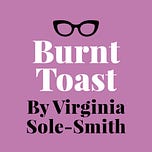



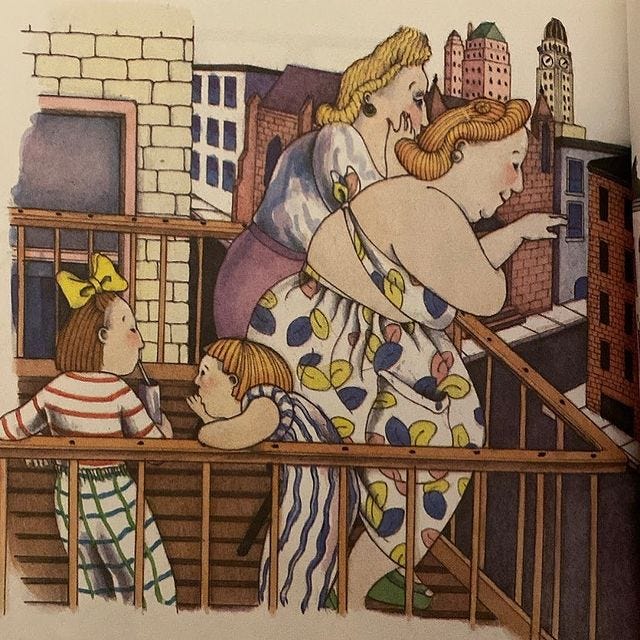
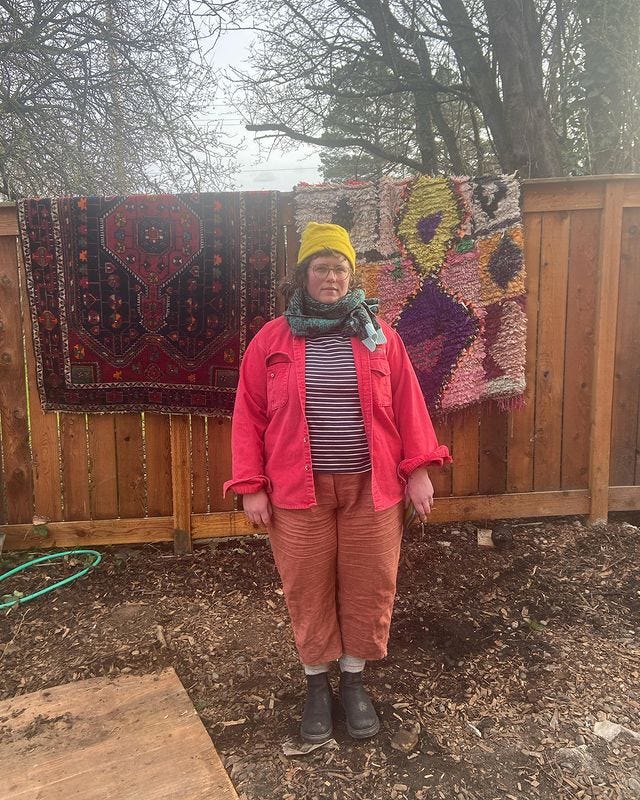
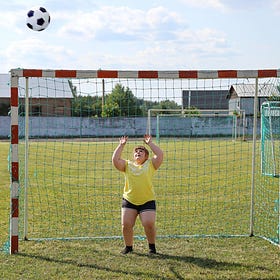



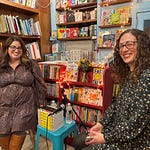
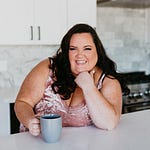
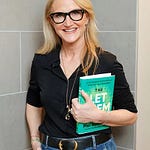
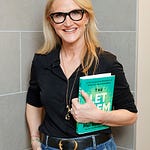
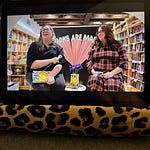

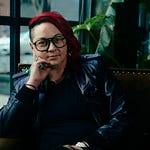

Share this post